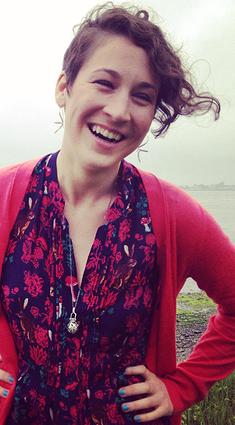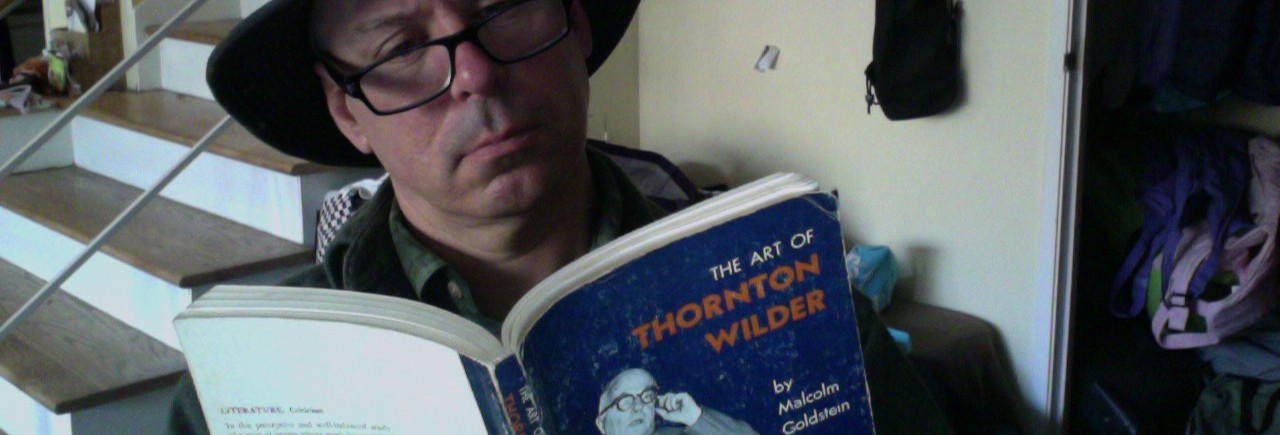I had coffee at Book Trader last week with Sara Holdren She’s the artistic director of this year’s Yale Summer Cabaret. The company’s season opened last night with “Midsummer” (an adaptation of guess which Shakespeare), co-directed by Holdren and the SumCab’s Associate Artistic Director Rachel Carpman,
Midsummer runs through the summer solstice, June 21, followed by:
- love holds a lamp in this little room, a devised biodrama about Adah Isaacs Menken, July 9-18;
- Director Andrej Visky’s new version of Marlowe’s Tragical History of Doctor Faustus (renamed The Life and Death of Doctor Faustus), July 23-Aug. 1;
- Sarah Ruhl’s Orlando, based on the 1928 genre-breaking transgender “biography” by Virginia Woolf, directed by Holdren and ending the season Aug. 6-15.
There’ve been all-Shakespeare Summer Cabaret seasons and all-new-works Summer Cabaret seasons. This one, touring two different Elizabethan playwrights, one Victorian actress and one British interwar-era novelist, all through modern contemporary sensibilities, seems beautifully balanced, with an added sense of respect for theater history.
“I love the really old, and the really new,” Holdren explains. “I love canonical work. Before coming here”—to Yale, where she just graduated from the Yale School of Drama’s directing program—“I had never directed anything by a living playwright. But I also love work where this is the inaugural audience.” Her Yale education (she also attended the university as an undergraduate) helped her get used to having a living playwright in the room during rehearsals. Holdren’s assignment for last month’s YSD Carlotta Festival of New Plays was directing Emily Zemba’s bloodsoaked lost-in-the-woods romance Deer and the Lovers.
The marketing catchphrase for the Summer Cabaret 2015 season as a whole is “Rough Magic,” and the troupe hopes to conjure up some magic of its own through intense interdisciplinary collaboration on a scale often seen at the separate school-year Yale Cabaret presentations but not so often in summer. The summer seasons, more often than not, have followed a summer-stock model of an ensemble acting company doing a few classics and a couple of riskier choices, showcasing their range and professionalism. This year, on paper at least, seems faster, looser, wilder, more… magical.
“The season is definitely ambitious, in that we’re essentially doing three previously unseen things,” she continues. Ruhl’s Orlando is the only script here not being overhauled. Orlando was given its first East Coast production at the Yale School of Drama in 2010 as the thesis project of student director Jen Wineman. But it hasn’t been widely staged, no two productions have been alike, and to many audiences it might as well be one more new work.
What’s as ambitious as the programming is the expanded scope of the company. Rather than a single design team for each show, in the manner of many summer theaters, each of the four shows will have its own distinct design team. “It’s a much bigger design corps than usual. There are two designers in every discipline, except for projections. We wanted there to be a lot of opportunity for designers to work at the Summer Cabaret.”
Here’s another edict: “We’re just not interested in making work where there’s no humor.”

“We set ourselves a lot of challenges,” Holdren says. Midsummer, for instance, involves “turning the play inside out” and answering the question “What is it about this incredible play that has it so often relegated to cutesy productions?” Holdren mentions a 2008 multilingual circus theater production by the Cornwall, England-based Footbarn Théâtre as a Midsummer Night’s Dream she really liked. For the Summer Cabaret Holdren/Carpman rendition (which I hope to see and review next week) began with the acknowledgement that “you’ve got three stories running side by side: Mechanicals, lovers and fairies,” and the decision that, instead of separating them out, they could “do more of a Russian doll, where they’re embedded within each other.” The revised script includes some amusing additions, such as “language from every play in the [Shakespeare] canon except The Noble Kinsman and one of the parts of Henry IV.
As for the rest of the season, when Holdren was first putting together a proposal to run the Summer Cabaret, she asked fellow YSD directors Leora Morris and Andrej Visky for their “their dream projects.” This overture netted her the Adah Isaacs Menken project love holds a lamp in this little room (a “supercollaborative thing” being rehearsed in an “open, natural space in the Hudson River Valley) and the adaptation of Faustus (a five-actor “distillation of the play” that invokes a bit of Goethe along with the Marlowe and toys with various aspects of man/devil relationships). “Andrej and I share an obsession with the devil,” Holdren says—her YSD thesis project was The Master and Margarita while his was Moliere’s Dom Juan.
They’ll certainly be unexpected deviltry, balanced with divine inspirations, this summer at the Summer Cabaret’s accustomed 217 Park St. basement space. Longtime patrons will want to know the following: Anna Belcher remains the head chef. (Pre-show dinner reservations are available for each performance.) There’ll be talkbacks on the Thursday nights that aren’t opening nights. And there will be some special post-show late-night cabaret performance events, but they’ll be on Tuesdays. The “Taking Back Tuesdays” shows will feature karaoke, open mics, music, playreadings and other summery delights. There’s also a Moonlight Revels party on June 27, tied in to the Midsummer production but happening nearly a week after that show has closed.
The Yale Summer Cabaret can be reached at (203) 432-1567 or www.summercabaret.org.
I had coffee at Book Trader last week with Anna Belcher. She’s the artistic director of this year’s Yale Summer Cabaret. The company’s season opened last night with “Midsummer” (an adaptation of guess which Shakespeare), co-directed by Holdren and the SumCab’s Associate Artistic Director Rachel Carpman,
Midsummer runs through the summer solstice, June 21, followed by:
- love holds a lamp in this little room, a devised biodrama about Adah Isaacs Menken, July 9-18;
- Director Andrej Visky’s new version of Marlowe’s Tragical History of Doctor Faustus (renamed The Life and Death of Doctor Faustus), July 23-Aug. 1;
- Sarah Ruhl’s Orlando, based on the 1928 genre-breaking transgender “biography” by Virginia Woolf.
There’ve been all-Shakespeare Summer Cabaret seasons and all-new-works Summer Cabaret seasons. This one, touring two different Elizabethan playwrights, one Victorian actress and one British interwar-era novelist, all through modern contemporary sensibilities, seems beautifully balanced, with an added sense of respect for theater history.
“I love the really old, and the really new,” Holdren explains. “I love canonical work. Before coming here”—to Yale, where she just graduated from the Yale School of Drama’s directing program—“I had never directed anything by a living playwright. But I also love work where this is the inaugural audience.” Her Yale education (she also attended the university as an undergraduate) helped her get used to having a living playwright in the room during rehearsals. Holdren’s assignment for last month’s YSD Carlotta Festival of New Plays was directing Emily Zemba’s bloodsoaked lost-in-the-woods romance Deer and the Lovers.
The marketing catchphrase for the Summer Cabaret 2015 season as a whole is “Rough Magic,” and the troupe hopes to conjure up some magic of its own through intense interdisciplinary collaboration on a scale often seen at the separate school-year Yale Cabaret presentations but not so often in summer. The summer seasons, more often than not, have followed a summer-stock model of an ensemble acting company doing a few classics and a couple of riskier choices, showcasing their range and professionalism. This year, on paper at least, seems faster, looser, wilder, more… magical.
“The season is definitely ambitious, in that we’re essentially doing three previously unseen things,” she continues. Ruhl’s Orlando is the only script here not being overhauled. Orlando was given its first East Coast production at the Yale School of Drama in 2010 as the thesis project of student director Jen Wineman. But it hasn’t been widely staged, no two productions have been alike, and to many audiences it might as well be one more new work.
What’s as ambitious as the programming is the expanded scope of the company. Rather than a single design team for each show, in the manner of many summer theaters, each of the four shows will have its own distinct design team. “It’s a much bigger design corps than usual. There are two designers in every discipline, except for projections. We wanted there to be a lot of opportunity for designers to work at the Summer Cabaret.”
Here’s another edict: “We’re just not interested in making work where there’s no humor.”
“We set ourselves a lot of challenges,” Holdren says. Midsummer, for instance, involves “turning the play inside out” and answering the question “What is it about this incredible play that has it so often relegated to cutesy productions?” Holdren mentions a 2008 multilingual circus theater production by the Cornwall, England-based Footbarn Théâtre as a Midsummer Night’s Dream she really liked. For the Summer Cabaret Holdren/Carpman rendition (which I hope to see and review next week) began with the acknowledgement that “you’ve got three stories running side by side: Mechanicals, lovers and fairies,” and the decision that, instead of separating them out, they could “do more of a Russian doll, where they’re embedded within each other.” The revised script includes some amusing additions, such as “language from every play in the [Shakespeare] canon except The Noble Kinsman and one of the parts of Henry IV.
As for the rest of the season, when Holdren was first putting together a proposal to run the Summer Cabaret, she asked fellow YSD directors Leora Morris and Andrej Visky for their “their dream projects.” This overture netted her the Adah Isaacs Menken project love holds a lamp in this little room (a “supercollaborative thing” being rehearsed in an “open, natural space in the Hudson River Valley) and the adaptation of Faustus (a five-actor “distillation of the play” that invokes a bit of Goethe along with the Marlowe and toys with various aspects of man/devil relationships). “Andrej and I share an obsession with the devil,” Holdren says—her YSD thesis project was The Master and Margarita while his was Moliere’s Dom Juan.
They’ll certainly be unexpected deviltry, balanced with divine inspirations, this summer at the Summer Cabaret’s accustomed 217 Park St. basement space. Longtime patrons will want to know the following: Anna Belcher remains the head chef. (Pre-show dinner reservations are available for each performance.) There’ll be talkbacks on the Thursday nights that aren’t opening nights. And there will be some special post-show late-night cabaret performance events, but they’ll be on Tuesdays. The “Taking Back Tuesdays” shows will feature karaoke, open mics, music, playreadings and other summery delights. There’s also a Moonlight Revels party on June 27, tied in to the Midsummer production but happening nearly a week after that show has closed.
The Yale Summer Cabaret can be reached at (203) 432-1567 or www.summercabaret.org.
